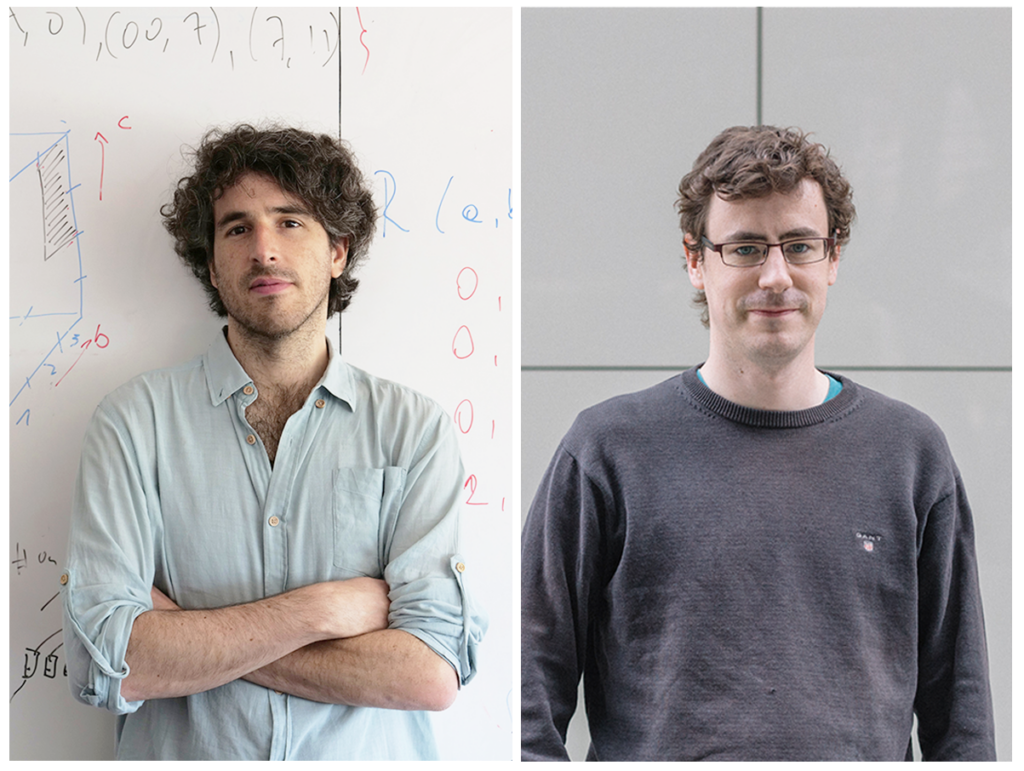Juan Reutter y Aidan Hogan asumen como nuevos directores del IMFD
Diciembre, 2023.- La investigación científica, cuando está acompañada de un componente importante de autorreflexión, y cuando sus líderes dan cabida a la visión de investigadores más jóvenes, tiene más posibilidades no sólo de renovar su mirada, sino también de estar más en sintonía con lo que requiere la sociedad.
Esta es la visión de Marcelo Arenas, profesor titular y académico de Computación de la Pontificia Universidad Católica de Chile, sobre el cambio de directores del Instituto Milenio Fundamentos de los Datos (IMFD) para el segundo quinquenio (2023-2028) de este centro de investigación. En este proceso de cambio progresivo en 2022 Pablo Barceló, director del Instituto de Ingeniería Matemática y Computacional UC, había dejado el cargo de subdirector.
A contar de diciembre de 2023, asumen oficialmente Juan Reutter de la Maza como director principal y Aidan Hogan como director alterno del IMFD, rol que venían ejerciciendo desde junio de 2023, inicio del sexto año de operaciones de este centro de investigación que cuenta con financiamiento de la Iniciativa Científica Milenio, dependiente de la Agencia Nacional de Investigación y Desarrollo (ANID).
Juan Reutter de la Maza es profesor asociado y jefe de Posgrado del Departamento de Ciencia de la Computación de la Universidad Católica de Chile (DCC UC). Además, es académico del Instituto de Ingeniería Matemática y Computacional de la Universidad Católica (IMC UC).
“Una de mis metas para el nuevo quinquenio del IMFD es potenciar la innovación con base científica que el IMFD ha venido creando en los últimos años. Tenemos experiencia en salud con la plataforma para el Test KoR que desarrollamos durante la pandemia y con el uso de metodología thick-data para estudiar fenómenos sociales complejos, como Plataforma Telar y nuestros estudios de las zonas de sacrificio”, señala Juan Reutter.
A estas experiencias se suman nuevos proyectos, entre los que destaca MillenniumDB, un poderoso motor de búsqueda para bases de datos de grafos, cuyas promisorias aplicaciones dan muestra de que es competitivo con otros del mercado.
“El IMFD ha sido conocido hasta ahora por contar con científicos líderes en sus campos, que generan conocimiento que está en la frontera de la investigación. Queremos ahora ser conocidos también por ser creadores de innovación, por nuestros desarrollos que pueden ser aplicados a mejoras sustanciales en distintos campos”, agrega el nuevo director del IMFD.
Foco en la innovación y en fortalecer la comunidad de estudiantes
Aidan Hogan, Ph.D. en Ciencia de la Computación de la Universidad Nacional de Irlanda, Galway, es profesor asociado del Departamento de Ciencias de la Computación de la Universidad de Chile, casa de estudios que le otorgó el premio a Mejor Docente de Pregrado en 2016 y 2020. Hogan ha sido un importante impulsor de la conexión entre las distintas áreas de la ciencia de computación que se abordan en el IMFD, como los sistemas de bases de datos con los lenguajes de consulta para grafos.
El académico indica que una de sus primeras metas sería aumentar la participación y visibilidad del IMFD en las universidades asociadas al instituto, comenzando este trabajo en su casa de estudios, la Universidad de Chile. “Además, me gustaría fortalecer a la comunidad de estudiantes del IMFD, generando espacios en los que puedan compartir experiencias, perspectivas, y darles apoyo. Esta meta para mí tiene la más alta prioridad, considerando que los estudiantes están saliendo del aislamiento asociado a la pandemia y su impacto aún se siente, en distintas dimensiones”.
Ambos investigadores comparten, además, los objetivos principales del IMFD: promover investigación de alto impacto en beneficio de la sociedad, aumentar la visibilidad del IMFD a nivel internacional como centro de excelencia, fomentar colaboraciones nuevas entre personas que no habían trabajando juntas antes, y capacitar a la próxima generación de expertos para hacer frente a los desafíos de una sociedad que basa cada vez su funcionamiento en los datos.

En la huella del fomento a la interdisciplina
Tanto para Reutter, como para Hogan, seguir las huellas del trabajo hecho por Marcelo Arenas y Pablo Barceló representa un gran desafío, pero también la oportunidad de enriquecer lo sembrado por los académicos. “Formar colaboraciones entre personas con experiencia en áreas tan diversas como estadística, ciencias políticas, comunicaciones y ciencias de la computación es un desafío enorme, y requiere de un liderazgo no sólo científico, sino también en términos humanos. Requiere, además, ser abierto y creativo respecto de las vía para juntar las diferentes disciplinas. Eso es algo que Marcelo y Pablo lograron de manera notable y serán un ejemplo a seguir”, comenta Aidan Hogan.
Para Reutter, la evaluación sobresaliente al término del primer quinquenio del IMFD es una evidencia del liderazgo y capacidades de Arenas y Barceló, que dieron origen e impulso al instituto. “Ellos nos dejaron un legado que hoy nos permite mirar hacia el futuro con fundamentos sólidos, con un trabajo en investigación científica interdisciplinaria que nos permite estar a la vanguardia a nivel latinoamericano. Su gestión, además, está marcada por la creación de un ambiente en el IMFD que no solamente es de excelencia y profesionalismo, sino también de apertura a las nuevas ideas, pluralista y amigable. Sus logros forman una base sólida para seguir avanzando en los próximos cinco años”, concluye Reutter.
